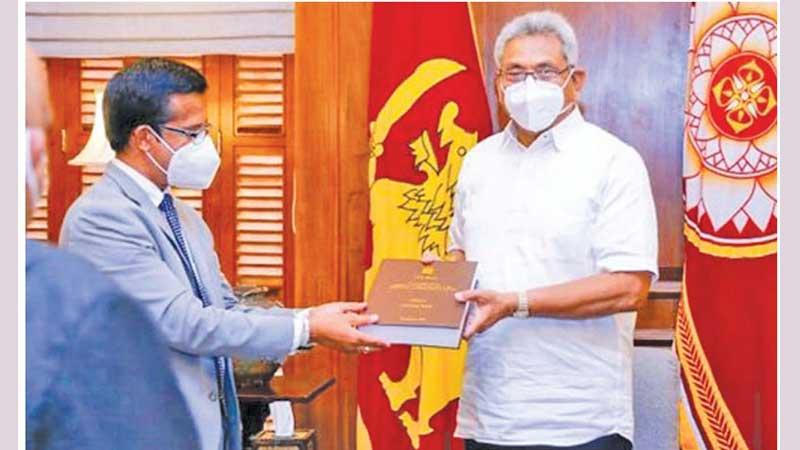
The Presidential Commission of Inquiry (PCoI) on the Easter Sunday attacks concluded its proceedings and handed over its final report consisting of its findings and recommendations to President Gotabaya Rajapaksa on February 1.
According to sources, the Commission has levelled allegations against a number of Cabinet members and senior Government officials of the previous Yahapalana Government for failing to prevent the attacks. The recommendations of the commission report will be presented to the court by the Attorney General (AG) soon.
The Commission held its proceedings for over a year. The report was the culmination of 241 sittings which recorded evidence from 457 witnesses. It consists of 472 pages, 215 attachments and six volumes. The first and second interim reports of the Commission were presented on December 20, 2019 and March 2, 2020.
The Commission was appointed on September 22, 2019, by former President Maithripala Sirisena to investigate and report on the coordinated terror attacks on Easter Sunday the same year that killed at least 270 persons and wounded 500 others.
The eight terrorists that carried out the attacks targeting several churches and luxury hotels in the country were identified as members of the National Towheed Jamath (NTJ), a homegrown extremist Islamic organisation led by its leader Zahran Hashim. The PCoI was appointed to find the planners of the attacks and reveal those in the Government and other agencies that failed to prevent it.
President’s assurance
President Gotabaya Rajapaksa, dressing the 73rd Independence Day celebration on February 4, assured that action will be taken against the perpetrators and others responsible for the attacks. “Action would be taken against all parties involved in the Easter Sunday attacks. Those responsible for planning, aiding and abetting will not be allowed to escape,” he said.
Minister Agriculture Mahindananda Aluthgamage told a gathering in Nawalapitiya on Friday that the Government will take action to punish the perpetrators of the Easter Sunday attacks within the next two to three weeks.
The Government will appoint a Cabinet Subcommittee to implement the recommendations of the Presidential Commission of Inquiry into the Easter Sunday bombings. It will study the Commission report and ensure that the recommendations are implemented expeditiously, according to sources.
Colombo Archbishop, Malcolm Cardinal Ranjith said the findings and recommendations of the report should be made public.
“We hope the Government will reveal the recommendations of the Commission and implement them,” he said at the Holy Mass at All Saints Church in Borella to mark the 73rd Independence Day.
It was revealed that Pulasthini Rajendra alias Sarah Jasmine, the wife Muhammadu Hasthun, who detonated the bomb at St. Sebastian’s Church in Katuwapitiya, had survived the shootout between the security forces and NTJ terrorists at Sainthamaruthu on April 26, just days after the attacks. The Commission was also presented with evidence that she had fled to India by the sea in September 2019.
Prosecution in US
Three Lankans were charged in the US in December for ‘supporting an Islamic State cell responsible for the 2019 Easter attacks in Sri Lanka that killed 268 people, including five U.S. citizens,’ foreign media reported.
The three Lankans, identified as Mohamed Naufar, Mohamed Anwar Mohamed Riskan and Ahamed Milhan Hayathu Moahmed were charged in Federal Court in the U.S. city of Los Angeles, according to a Justice Department statement issued early January 2021.
“According to the charges, the defendants were committed supporters of ISIS, recruited others to ISIS’s violent cause, purchased materials for and made Improvised Explosive Devices (IEDs), helped prepare and trained others who participated in the attacks and murdered in the name of this deadly foreign terrorist organisation,” John C. Demers, an Assistant Attorney General who leads the Justice Department’s National Security Division, said in a statement.
The Commission highlighted the complete collapse of the intelligence and security apparatus of the country during the previous Government. Information was revealed on how Sri Lanka received prior warnings of the attack on April 4, just days leading to the attacks and how the information was mis-communicated. It also revealed that clashes within the then Government had disrupted the proper functioning of the Security Council leaving the country vulnerable.
